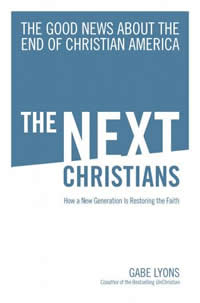Book Notes
 Gabe Lyons, The Next Christians; The Good News About the End of Christian America. How a New Generation is Restoring the Faith (New York: Doubleday, 2010), 230pp.
Gabe Lyons, The Next Christians; The Good News About the End of Christian America. How a New Generation is Restoring the Faith (New York: Doubleday, 2010), 230pp.
Back in 2007 David Kinnaman and Gabe Lyons published a book called UnChristian; What a New Generation Really Thinks About Christianity. The book, based upon a three-year Barna study, documented how sixteen to twenty-nine year olds view Christians with hostility, resentment and disdain. According to their study, here are the percentages of people outside the church who think that the following words describe present-day Christianity:
* antihomosexual 91%
* judgmental 87%
* hypocritical 85%
* old-fashioned 78%
* too political 75%
* out of touch with reality 72%
* insensitive to others 70%
* boring 68%
It would be hard to overestimate, wrote Kinnaman, "how firmly people reject — and feel rejected by — Christians" (19). Or think about it this way, he suggested: "When you introduce yourself as a Christian to a friend, neighbor, or business associate who is an outsider, you might as well have it tattooed on your arm: antihomosexual, gay-hater, homophobic. I doubt you think of yourself in these terms, but that's what outsiders think of you" (93).
Lyons begins his newer book by recalling how he viewed the Barna study with embarrassment but also empathy. But that was then, and times have changed. "I believe this moment is unlike any other time in history" (p. 11). And at the end of the book: "the Christian movement is entering a time of transformation on a par with the Protestant Reformation" (p. 189). That's because, in his view, "Christian America" (never carefully defined) has died, and a new narrative has taken its place. "It's impossible for me to overstate this reality" (p. 19), that we now live in an age that is marked by three "unprecedented" cultural characteristics. We are now pluralistic, post-modern, and post-Christian.
According to Lyons, Christians have interacted with culture in ways that are either "separatist" or "cultural." But transcending these two ways are the new "restorers." In the bulk of the book Lyons describe this vanguard of believers by devoting one chapter to each of their six characteristics. The "restorers" are (1) provoked, not offended; (2) creators, not critics; (3) called, not employed; (4) grounded, not distracted; (5) in community, not alone; and (6) countercultural, not "relevant." Lyons makes his case by lots of anecdotal story-telling (one of the best parts about the book).
I was predisposed to appreciate this book because I liked his last one, but it has lots of problems. The bad old days of "Christian America" are by no means over. I suspect that if Barna repeated the empirical study the negative images of Christianity would remain high. As for the good news of a new narrative on an epic scale that rivals the Reformation, how could one ever know that? There's also a revealing and unstated presumption in Lyon's perspective: the book describes white Protestant evangelicals in America. This ignores dozens of other groups around the world, and presumes that no one, or at least very few Christians, have embodied the six characteristics of the "restorers." The simple bibliography reveals a narrow purview. Still, Lyons is well-placed to discern at least some changes among some believers, and the ones he identifies in this book represent genuinely good news.


